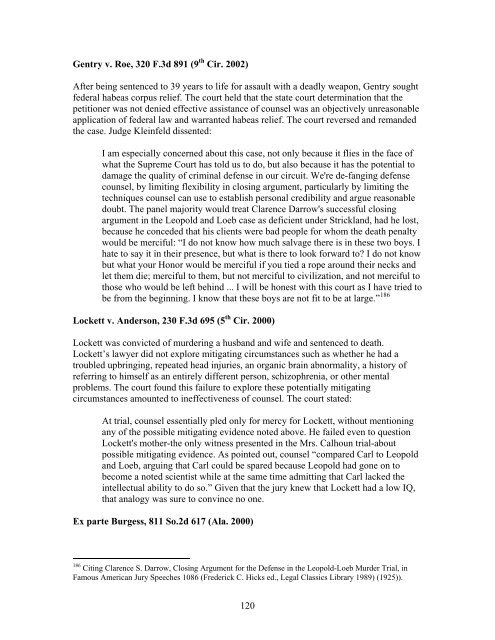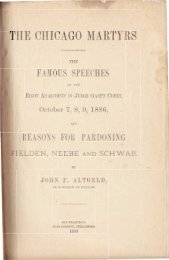Leopold and Loeb Trial - The Clarence Darrow Collection
Leopold and Loeb Trial - The Clarence Darrow Collection
Leopold and Loeb Trial - The Clarence Darrow Collection
Create successful ePaper yourself
Turn your PDF publications into a flip-book with our unique Google optimized e-Paper software.
Gentry v. Roe, 320 F.3d 891 (9 th Cir. 2002)<br />
After being sentenced to 39 years to life for assault with a deadly weapon, Gentry sought<br />
federal habeas corpus relief. <strong>The</strong> court held that the state court determination that the<br />
petitioner was not denied effective assistance of counsel was an objectively unreasonable<br />
application of federal law <strong>and</strong> warranted habeas relief. <strong>The</strong> court reversed <strong>and</strong> rem<strong>and</strong>ed<br />
the case. Judge Kleinfeld dissented:<br />
I am especially concerned about this case, not only because it flies in the face of<br />
what the Supreme Court has told us to do, but also because it has the potential to<br />
damage the quality of criminal defense in our circuit. We're de-fanging defense<br />
counsel, by limiting flexibility in closing argument, particularly by limiting the<br />
techniques counsel can use to establish personal credibility <strong>and</strong> argue reasonable<br />
doubt. <strong>The</strong> panel majority would treat <strong>Clarence</strong> <strong>Darrow</strong>'s successful closing<br />
argument in the <strong>Leopold</strong> <strong>and</strong> <strong>Loeb</strong> case as deficient under Strickl<strong>and</strong>, had he lost,<br />
because he conceded that his clients were bad people for whom the death penalty<br />
would be merciful: “I do not know how much salvage there is in these two boys. I<br />
hate to say it in their presence, but what is there to look forward to? I do not know<br />
but what your Honor would be merciful if you tied a rope around their necks <strong>and</strong><br />
let them die; merciful to them, but not merciful to civilization, <strong>and</strong> not merciful to<br />
those who would be left behind ... I will be honest with this court as I have tried to<br />
be from the beginning. I know that these boys are not fit to be at large.” 186<br />
Lockett v. Anderson, 230 F.3d 695 (5 th Cir. 2000)<br />
Lockett was convicted of murdering a husb<strong>and</strong> <strong>and</strong> wife <strong>and</strong> sentenced to death.<br />
Lockett’s lawyer did not explore mitigating circumstances such as whether he had a<br />
troubled upbringing, repeated head injuries, an organic brain abnormality, a history of<br />
referring to himself as an entirely different person, schizophrenia, or other mental<br />
problems. <strong>The</strong> court found this failure to explore these potentially mitigating<br />
circumstances amounted to ineffectiveness of counsel. <strong>The</strong> court stated:<br />
At trial, counsel essentially pled only for mercy for Lockett, without mentioning<br />
any of the possible mitigating evidence noted above. He failed even to question<br />
Lockett's mother-the only witness presented in the Mrs. Calhoun trial-about<br />
possible mitigating evidence. As pointed out, counsel “compared Carl to <strong>Leopold</strong><br />
<strong>and</strong> <strong>Loeb</strong>, arguing that Carl could be spared because <strong>Leopold</strong> had gone on to<br />
become a noted scientist while at the same time admitting that Carl lacked the<br />
intellectual ability to do so.” Given that the jury knew that Lockett had a low IQ,<br />
that analogy was sure to convince no one.<br />
Ex parte Burgess, 811 So.2d 617 (Ala. 2000)<br />
186 Citing <strong>Clarence</strong> S. <strong>Darrow</strong>, Closing Argument for the Defense in the <strong>Leopold</strong>-<strong>Loeb</strong> Murder <strong>Trial</strong>, in<br />
Famous American Jury Speeches 1086 (Frederick C. Hicks ed., Legal Classics Library 1989) (1925)).<br />
120

















